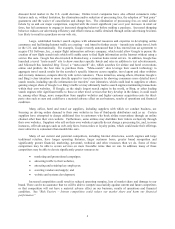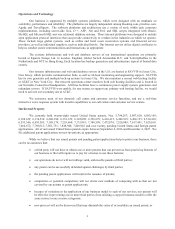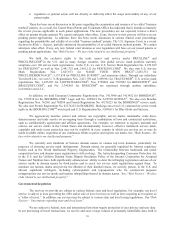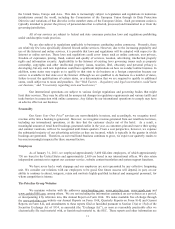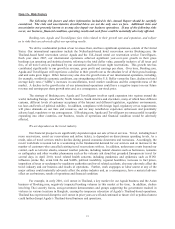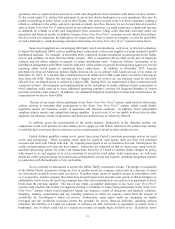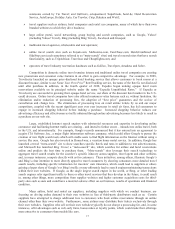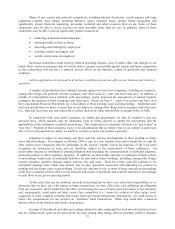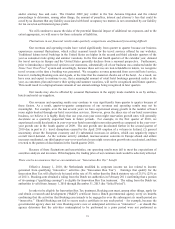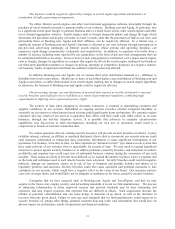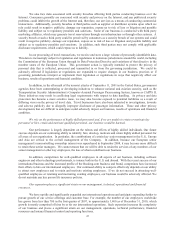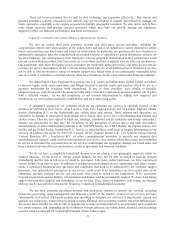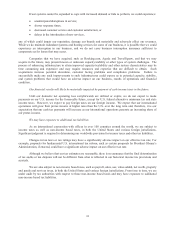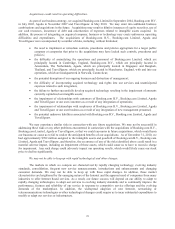Priceline 2010 Annual Report Download - page 90
Download and view the complete annual report
Please find page 90 of the 2010 Priceline annual report below. You can navigate through the pages in the report by either clicking on the pages listed below, or by using the keyword search tool below to find specific information within the annual report.16
independent suppliers reduces opacity and competition among suppliers. In such event, if we are unable to divert
sales to other suppliers, our business, results of operations and financial condition may be adversely affected.
In addition, any disruption in the supply of vehicles or the ability to dispose of vehicles by rental car
companies could impact the ability of the rental car companies to match their fleet supply with demand, which could
adversely impact our business. If the rental car industry is faced with excess supply, rental car companies may
lower retail rental car rates, which could be beneficial to our retail rental car business, but detrimental to our Name
Your Own Price® business. Retail rental car rates decreased during the year ended December 31, 2010 compared to
the same period in 2009 (despite Toyota’s January 2010 recall of over 8 million vehicles due to faulty accelerator
pedals, which led to a strain on rental car companies’ fleets and temporarily increased retail rental car rates).
Because rental car days are typically less expensive than airline tickets or hotel room night reservations, a reduction
in retail rental car rates has a disproportionately adverse effect on sales of Name Your Own Price® rental car days
since customers may be less likely to accept the trade-offs associated with that service. If the industry is faced with
a shortage of vehicles, rental car companies may further reduce the number of car reservations they distribute
through our service or increase the negotiated rates at which they are willing to provide car reservations. For
example, since the recent worldwide recession, the rental car industry has generally reduced its fleet capacity, which
has limited the amount of discounted rental car days available for our Name Your Own Price® rental car service.
We are exposed to fluctuations in currency exchange rates.
As a result of the growth of Booking.com and Agoda, and the acquisition of TravelJigsaw, we are
conducting a significant portion of our business outside the United States and are reporting our results in U.S.
Dollars. As a result, we face exposure to adverse movements in currency exchange rates as the financial results of
our international operations are translated from local currency (principally the Euro and the British Pound Sterling)
into U.S. Dollars upon consolidation. Our international operations contributed approximately $1.4 billion to our
revenues for the year ended December 31, 2010, respectively, which compares to $852.0 million for the year ended
December 31, 2009 (year-over-year growth of approximately 70%). Revenue attributable to our international
operations increased on a local currency basis by approximately 77% in the year ended December 31, 2010,
compared to the same period in 2009. Booking.com, Agoda and TravelJigsaw also face foreign exchange risk as
their foreign-denominated revenues, expenses, receivables and payables are translated into their respective
functional currencies. For example, in the fourth quarter of 2010, the U.S. Dollar was stronger against the Euro and
the British Pound Sterling, relative to the fourth quarter of 2009, which negatively impacted the growth rates of our
Euro and British Pound Sterling denominated gross bookings, gross profit and net income as expressed in U.S.
Dollars.
In early 2010, Greece and certain other European Union countries with high levels of sovereign debt had
difficulty refinancing that debt and central bank intervention was required, causing significant devaluation of the
Euro relative to other currencies, such as the U.S. Dollar, and concerns that sovereign defaults could lead to
devaluation or abandonment of the common currency. Sovereign debt issues could lead to further significant, and
potentially longer-term, devaluation of the Euro against the U.S. Dollar, which would adversely impact our Euro-
denominated net assets, gross bookings, revenues, operating expenses, and net income as expressed in U.S. Dollars.
In addition, many governments around the world, including the U.S. government, are operating at very large
financial deficits. Disruptions in the economies of such governments could cause, contribute to or be indicative of,
deteriorating macro-economic conditions. Furthermore, governmental austerity measures aimed at reducing deficits
could impair the economic recovery and adversely affect travel demand.
Intense competition could reduce our market share and harm our financial performance.
We compete with both online and traditional sellers of the services we offer. The market for the services we
offer is intensely competitive, and current and new competitors can launch new sites at a relatively low cost. We
may not be able to effectively compete with industry conglomerates such as Expedia, Orbitz Worldwide or Sabre,
each of which may have access to significantly greater and more diversified resources than we do.
We currently or potentially compete with a variety of companies with respect to each service we offer.
With respect to our travel services, these competitors include, but are not limited to:
x Internet travel services such as Expedia, Hotels.com, Hotwire and Venere, which are owned by Expedia;
Travelocity, lastminute.com and Zuji, which are owned by the Sabre Group; Orbitz.com, Cheaptickets,
ebookers, HotelClub and RatesToGo, which are currently owned by Orbitz Worldwide; laterooms and




